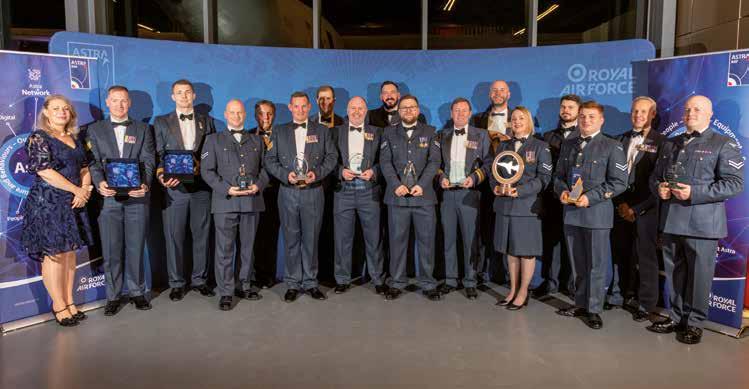
2 minute read
ASTRA AWARDS
Wed. 9 Nov 22 On Thurs. 27 Oct 22 the Astra Sustainability Award (sponsored by Jacobs) was awarded to Project BIOFUEL, from RAF Northolt - the Astra Sustainability Award was awarded to the individual or team that has made the best sustainable impact within Astra.
Over the last 18 months, led by Sqn Ldr Eliot Finnimore (the former OC Eng & Supply Sqn at RAF Northolt), and supported by FS Rob Boliver, FS Craig Gough, Sgt Ben Godfrey and Cpl Oliver Hallstead- Brooks the Project BIOFUEL Sprint team, has made a huge contribution to informing the RAF’s journey towards Net Zero 2040. Specifically, for their initiative in identifying the opportunity to trial Sustainable Aviation Fuel (SAF) on a legacy aircraft, their tenacity in overcoming multiple hurdles to progress opportunity into reality, and their commitment to making a tangible difference to the sustainability pillar.
Their trial of Sustainable Aviation Fuel (SAF) on the BAe 146 aircraft assessed every element of using different blends of sustainable fuel for aircraft in the RAF. It also looked at how the fuel would be supplied, stored and transported to inform future work and made a tangible difference to sustainability in Defence. Recognising the significant carbon footprint caused by the aviation industry, the Sprint team came up with the concept of assessing the potential CO2 emission savings that could be made through use of SAF on 32 Sqn’s BAe146 aircraft, and the logistics of shipping and transporting SAF to RAF Northolt, to scope its future use on a sustainable footing. Recognising the lack of UK-derived product available on the market, the team conducted analysis into numerous suppliers across Europe and the USA and the logistics involved in moving these products to the UK, to identify a viable SAF supply chain for the RAF. This research not only identified the optimum supply chain process, but also that by obtaining the fuel via a European supplier, the CO2 emissions produced in transporting the fuel by sea and road were negligible when compared with the net savings that could be made by using SAF on the BAe146. Significantly, their findings highlighted that even a SAF blend as low as 5% could save RAF Northolt over 200T of CO2 emissions per year, equivalent to the annual heating for over 100 homes and the annual fuel use for over 200 cars.

Not satisfied with stopping at the research phase, the team leader Sqn Ldr Eliot Finnimore proposed a series of live trials on the BAe146 to validate the assumptions from the feasibility study i.e. to prove that the use of SAF could make an immediate and meaningful impact to RAF Northolt’s emissions profile. Working tirelessly to gain the necessary commercial, regulatory and financial approvals, the trials were able to proceed, demonstrating that transition to new fuel types could be feasible even into legacy platforms in service. Not only has this proof of concept highlighted the potential CO2 savings that could be made, but it has also created a wave of positive PR through vehicles such as UK science weekly, the ASTRA network and the Defence Green Network, especially given the role of the now retired BAe146 in flying members of the royal family and senior government










